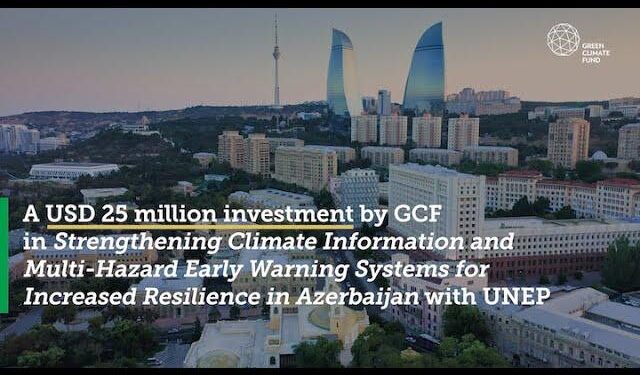The U.S. Department of State has released its 2024 Investment Climate Statements, providing a comprehensive overview of Azerbaijan’s economic environment and business landscape. The report offers critical insights into the opportunities and challenges facing investors in the country, highlighting key sectors, regulatory frameworks, and bilateral commercial ties between Azerbaijan and the United States. As Azerbaijan continues to position itself as a strategic hub in the South Caucasus, this latest assessment sheds light on the evolving investment climate and the implications for foreign businesses seeking to enter or expand within the Azerbaijani market.
Investment Opportunities and Challenges in Azerbaijan’s 2024 Market Landscape
Azerbaijan’s evolving market environment in 2024 presents a complex blend of promising opportunities and significant hurdles for investors. The country’s strategic location as a gateway between Europe and Asia enhances its appeal for sectors such as energy, logistics, and technology. Furthermore, recent government initiatives aimed at diversifying the economy offer incentives for foreign investors, including tax breaks, streamlined licensing procedures, and support for public-private partnerships. Key growth sectors identified for the year include:
- Renewable energy projects, especially wind and solar power
- Information and Communication Technology (ICT)
- Transport infrastructure modernization
- Agribusiness expansion with a focus on export potential
Despite these opportunities, investors face persistent challenges shaped by regulatory ambiguity, bureaucratic delays, and concerns around transparency. Political stability remains solid but requires ongoing vigilance as regional geopolitical tensions could affect market confidence and supply chains. Additionally, legal reforms are needed to ensure better intellectual property protections and to strengthen the judiciary’s role in commercial disputes. The following table summarizes the most critical factors influencing investment decisions in Azerbaijan for 2024:
| Factor | Status | Impact on Investment |
|---|---|---|
| Regulatory Environment | Improving but inconsistent | Moderate risk due to uncertainty |
| Political Stability | Stable with regional risks | Positive but with caution advised |
| Infrastructure Development | Expanding rapidly | Strong positive driver |
| Market Transparency | Needs enhancement | Potential barrier for newcomers |
Analyzing Regulatory Reforms and Their Impact on Foreign Investors
Recent regulatory reforms in Azerbaijan have introduced significant shifts aimed at fostering a more transparent and competitive investment environment. Key legislative changes focus on streamlining business registration processes, enhancing protections for intellectual property rights, and revising tax codes to attract more foreign direct investment. These reforms demonstrate the government’s commitment to aligning with international best practices, which is expected to boost investor confidence especially among U.S. companies exploring opportunities in sectors such as energy, infrastructure, and technology. However, challenges remain related to regulatory enforcement and unclear bureaucratic procedures, which continue to cause some hesitation among foreign investors.
The impact of these changes on foreign investors can be summarized in several critical areas:
- Improved Market Access: Simplified licensing procedures reduce entry barriers and cut down approval times.
- Enhanced Legal Safeguards: New dispute resolution mechanisms offer better protection for investor rights.
- Tax Incentives: Adjusted tax rates and exemptions for strategic sectors encourage longer-term commitments.
- Ongoing Risks: Despite reforms, inconsistent application at regional levels may pose operational uncertainties.
| Reform Area | Impact on Foreign Investors |
|---|---|
| Business Registration | Reduced processing time by 30% |
| Intellectual Property | Stronger enforcement mechanisms |
| Tax Policy | Sector-specific incentives introduced |
| Dispute Resolution | Introduction of international arbitration options |
Strategic Recommendations for Navigating Azerbaijan’s Emerging Economic Sectors
Investors aiming to capitalize on Azerbaijan’s swiftly evolving economic landscape should prioritize sectors where local government initiatives and international partnerships are converging. Renewable energy, particularly solar and wind, is receiving substantial policy support as the country embarks on its green transition. Additionally, burgeoning technology hubs in Baku offer promising opportunities for those looking to engage with fintech, software development, and telecommunications. Engaging with local stakeholders early and understanding the regulatory frameworks-especially the evolving data protection laws-will be crucial for sustainable market entry.
Successful navigation also demands attentiveness to Azerbaijan’s unique business culture and compliance environment. Collaboration with regional partners remains an effective way to mitigate risks associated with market entry, while leveraging government incentives can significantly enhance profitability. The following table highlights key sectors with their associated risks and benefits to guide strategic decision-making:
| Sector | Growth Potential | Key Challenges | Strategic Tips |
|---|---|---|---|
| Renewable Energy | High | Regulatory shifts | Engage early with regulators |
| Technology & Innovation | Moderate to High | Talent retention | Partner with local incubators |
| Agribusiness | Moderate | Infrastructure gaps | Leverage public-private partnerships |
Key Takeaways
In conclusion, the 2024 Investment Climate Statement for Azerbaijan underscores both the opportunities and challenges facing foreign investors in the country. While Azerbaijan’s strategic location and resource wealth continue to attract interest, issues such as regulatory transparency, governance, and judicial independence remain key factors for investors to consider. The U.S. Department of State’s latest assessment provides valuable insights for companies looking to navigate the evolving Armenian market landscape. As Azerbaijan pursues economic diversification and reforms, close attention to developments highlighted in this report will be essential for stakeholders aiming to make informed investment decisions in 2024 and beyond.
















